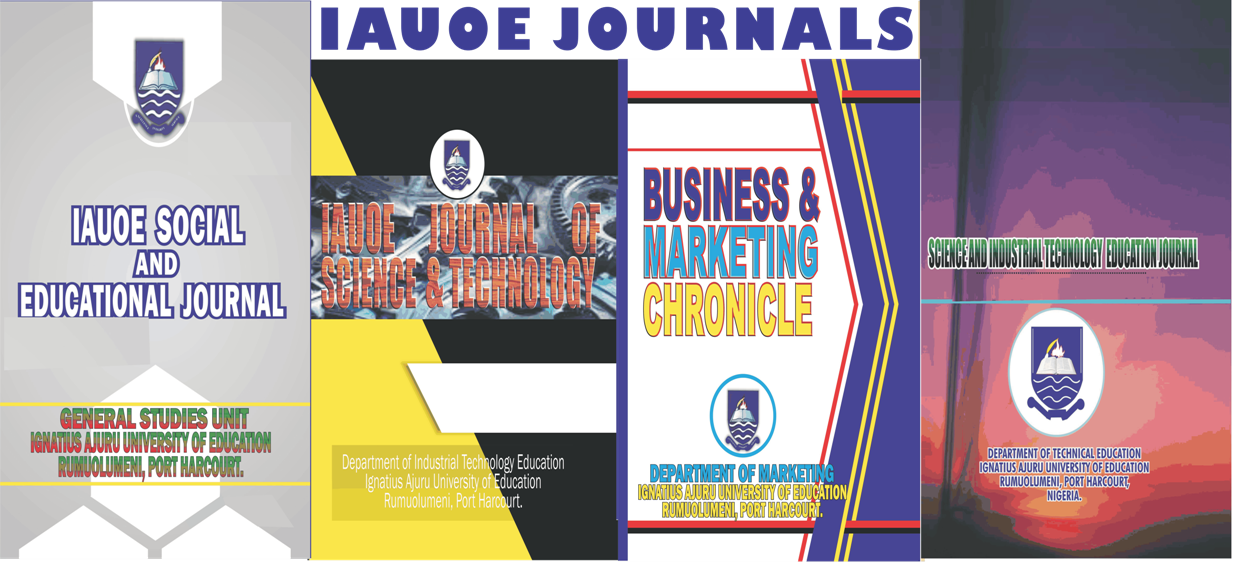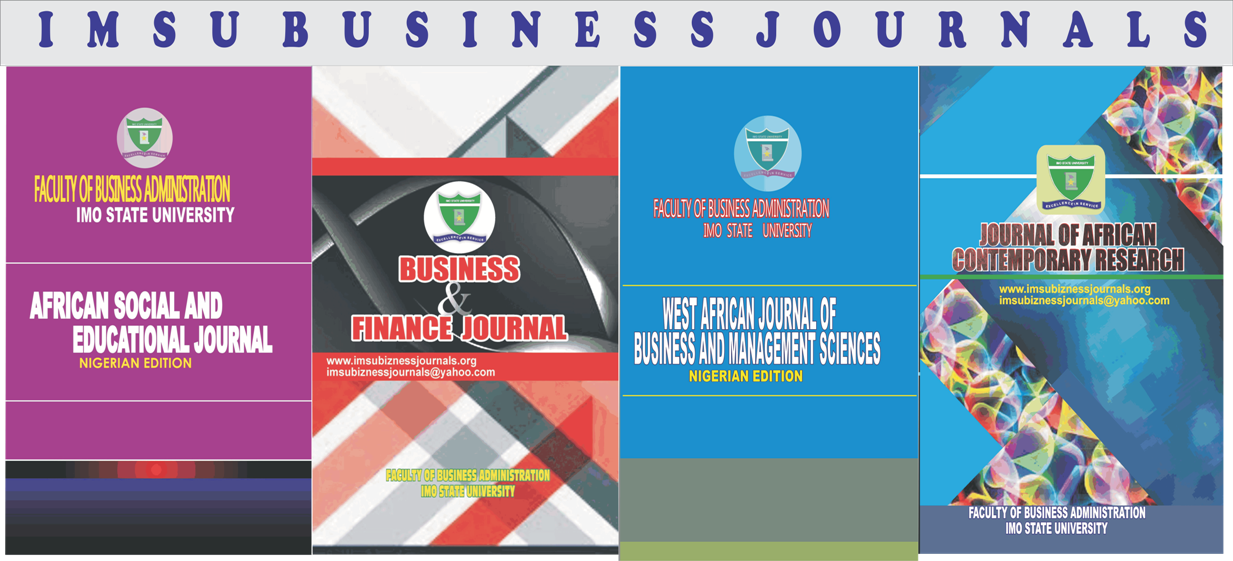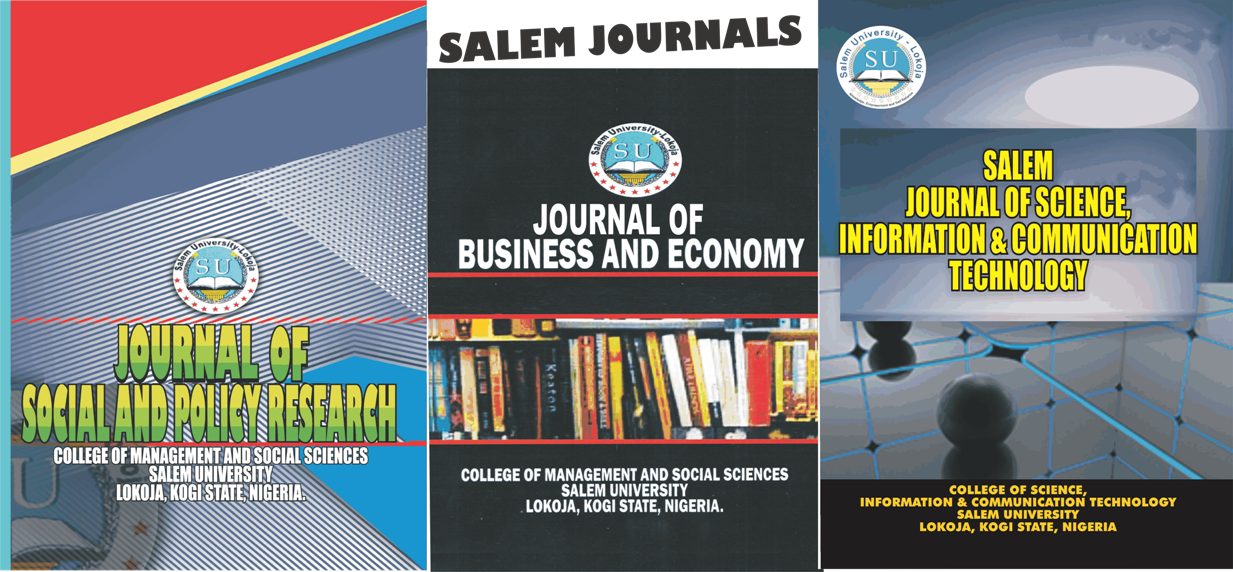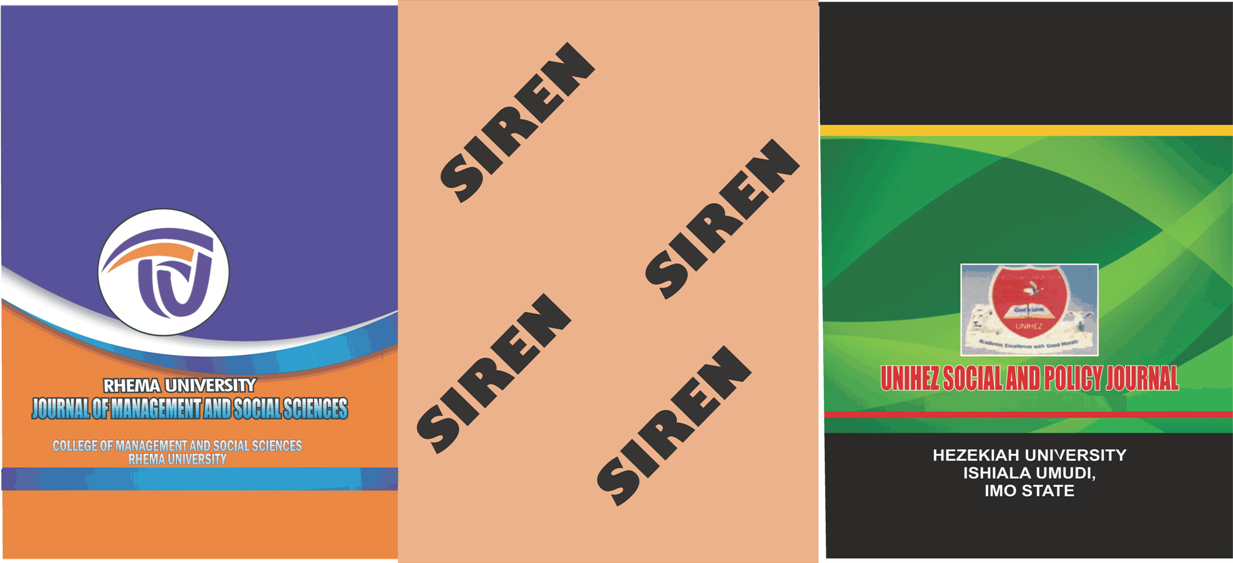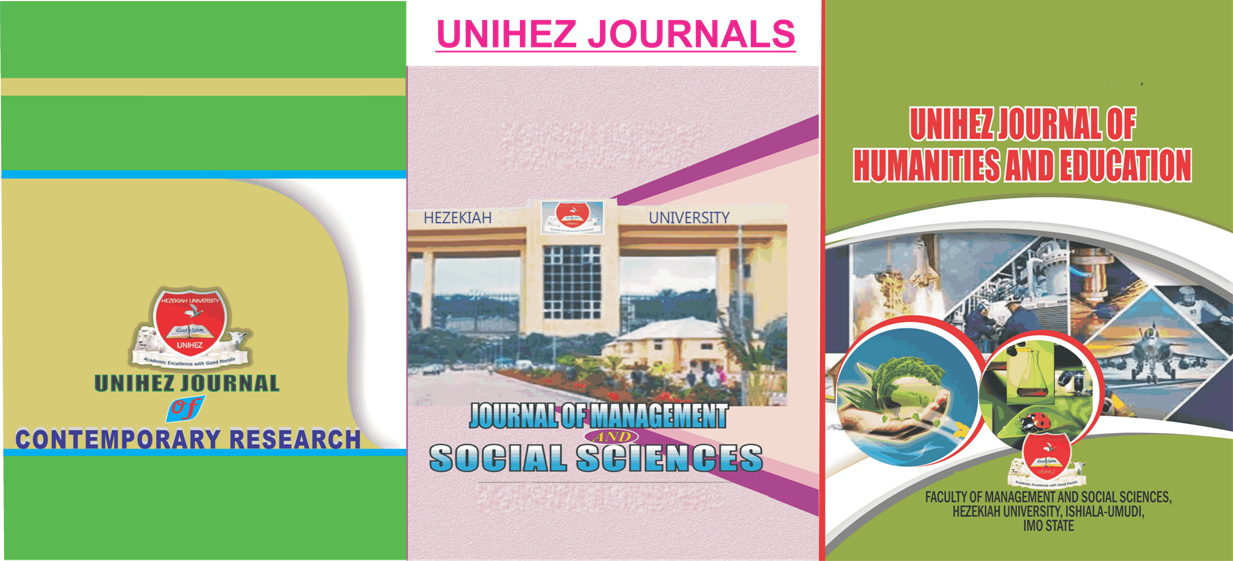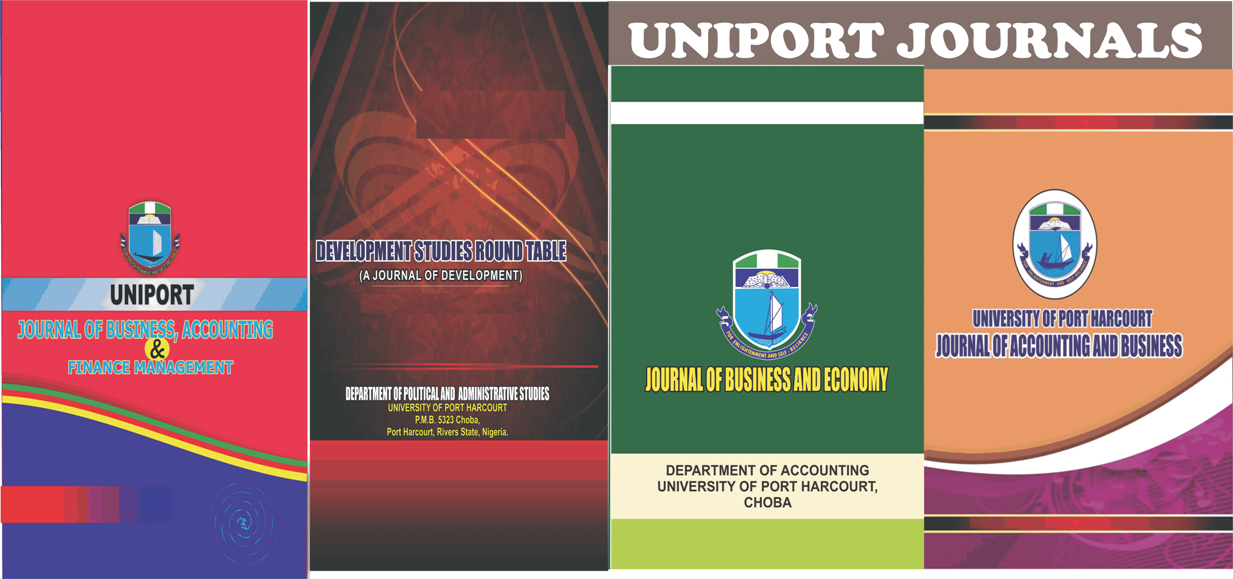2018 Archive
| 1 |
Title: THE CHALLENGES AND PROSPECTS OF EDUCATION AND HUMAN CAPITAL DEVELOPMENT RE-THINKING STRATEGIES FOR A SUSTAINABLE FUTURE OF NIGERIA.pdf Author: OKAFOR OBIEFUNA ANENE, PhD. Abstract: No Nation can truly be said to be developed without a commensurate development of its human capital. Nigeria is known to be one of the most populous nations in the world with abundant but dormant human and material capabilities. The acquisition of total education by the citizens of a country has been identified as the most veritable and comprehensive tool for the development of her human capital. In Nigeria, the development of the educational sector has suffered several challenges and setbacks since the post-colonial days. This paper seeks to trace the challenges which have confronted the development of this most vital sector in the economy. It will also attempt to highlight the prospects and opportunities of developing human capital in Nigeria with a view to re-creating strategies to ensure a sustainable future for the country. Keywords: National Development, Human Resources, Human Capital Development, Educational Development, sustainable future. View |
| 2 |
Title: IMPACT OF BANKING TECHNOLOGY ON ECONOMIC GROWTH IN NIGERIA.pdf Author: Achinihu, Okere, Mbagwu & Uzowuru Abstract: This paper examines the impact of banking technology in the area of electronic fund transfer system and economic growth in Nigeria for the period, 2009-2016. Data are sourced from CBN Statistical Bulletin and annual report. The tests for stationarity revealed that in all, variables are stationary at 1(1) order. Johansen Cointegration test is employed and it is found out that there is existence of long-run relationship among the variables. The Granger Causality result reveals a unit-directional causality between Real Domestic Product (RGDP) and banking technology in the area of internet banking (WEB) with internet banking (WEB) granger causing Real Domestic Product (RGDP. From the Ordinary Least Square Estimation result, R-2 is 0.79, showing high explanatory power of our explanatory variables meaning that our model is of good fit. The F-statistics is 30.34 which shows a significant relationship between our explanatory variables as a group ( ATM, MOBILE, POS, WEB) and the dependent variable (RGDP) at 5% level of significance. While individually using t-statistics, shows that there is significant relationship between ATM and RGDP while that of MOBILE, POS, WEB and RGDP is insignificant at 5% level of significance. We thereby reject our null hypothesis and conclude that there is significant relationship between Technological Advancement in banking in the area of Electronic Fund Transfer System and Economic Growth in Nigeria and recommend that efforts should be intensified in the awareness, provision, installation, security, accessibility and usage of ATM and internet banking in Nigeria in places where business and money are transacted no matter the location, value and volume to bring about sustained continuous increase in Gross Domestic Product in particular and economic growth in general. Keywords: ATM, Banking Technology and Mobile Banking View |
| 3 |
Title: TAX AS AN INSTRUMENT OF ECONOMIC GROWTH.pdf Author: Nnaji, Umeaka & Agusimba Abstract: This study tends to evaluate tax as an instrument of economic growth. In the study, different types of taxes are used as a proxy to tax and Real Gross Domestic Product is used as a proxy for economic growth. Relevant data to the study are collected from the Central Bank of Nigeria statistical bulletin, National Bureau of Statistics and Federal Inland Revenue Service. Regression is used in analyzing the Model. The Augmented Dickey-Fuller unit root test is employed to establish the stationarity of the variables while the General-to-Specific approach to Autoregressive Distributed Lag (ARDL) model is used for testing for the existence of long-run and short-run equilibrium conditions. The study finds that there exists a long run equilibrium relationship evidence between taxes and Real Gross Domestic Product (RGDP) during the period under study. The adjusted R2 value of 0.972914 shows that about 97.29% of the total variation in the real GDP is explained by the independent variables included in the model. The regression test also shows a very strong relationship among the variables. We therefore conclude that tax is a strong instrument of fiscal policy and therefore recommend that government should establish a strong fiscal responsibility and transparency system in the fiscal institutions; and combating of corruption and rise in investment activities should be a product of the tax reforms. Government debts should be channeled towards provision of critical infrastructure so as to provide the enabling investment environment, while fiscal policy should be complemented with the use of effective monetary policy. Keywords: Economic growth, Gross Domestic Product, CIT, VAT, PPT. View |
| 4 |
Title: VOCATIONAL TECHNICAL EDUCATION AND THE ECONOMIC SUSTAINABILITY OF THE NIGERIAN GRADUATES.pdf Author: Ibekwe & Joshua Abstract: The development and advancement of science and technology in many technological nations have made it imperative for technical education to be a major part of the educational curriculum, both at the basic and tertiary levels of education. This is to affirm the fact that no nation can sustain its economic growth and development without the support of technical and vocational education of its workforce. The foundation of the pre-independence (Nigeria) also lent credence to this fact, hence, development planners laid the foundation for the establishment of many technical colleges as well as polytechnics around Nigeria at different periods. The instability in government policies as a result of military interventions in the political and national development process led to discontinuity and abandonment of the very objectives for which the institutions were established. This study examines how technical education in Nigeria could be repositioned for economic sustainability of the Nigerian graduates. Keywords: Technical Education, Vocational Education, Graduate Empowerment, Economic Sustainability. View |
| 5 |
Title: PUBLIC CAPITAL INVESTMENTS AND SUSTAINABLE ECONOMIC DEVELOPMENT IN A DEPRESSED ECONOMY FOCUS ON NIGERIA.pdf Author: Ihejirika & Desmond Abstract: This paper applies the Bounds test under the ARDL model approach to cointegration to investigate the relationship between public capital investments and real gross domestic product. public capital investments is decomposed into capital investments in administration, economic, social and community services as well as transfer services, while sustainable economic development is measured by Real Gross Domestic Product. Empirical results show that there is a long run relationship between public capital investments and economic development. Furthermore, the long run form tests, through the error correction term, indicate that public capital investments have a causal effect on economic development. In addition, the result of the forecast evaluation on Root Mean Squared Error, Mean Absolute Error, Mean Absolute Percent Error, Thiel Inequality Coefficient, Bias Proportion, Variance Proportion, and Covariance Proportion show that economic development can be predicted using public capital investments variables of capital investments in administration, economic, social and community as well as transfer services. The study therefore concludes that public capital investments promote economic development in Nigeria. The study recommends increasing capital investments in social and community services (education and health) as it has proved to be beneficial to economic development through human capital development. On the other hand, capital investments in transfer services should be minimized as it negatively affects RGDP. Furthermore, capital investment in economic services should be re-examined to identify possible leakages that negate its effect on Real GDP against apriori expectations. Keywords: Public Capital Investments, Sustainable Economic Development, ARDL View |
| 6 |
Title: ENTREPRENEURSHIP EDUCATION AND THE CHALLENGES OF OVER POPULATED CLASSROOMS IN SELECTED STATE OWNED TERTIARY INSTITUTIONS IN RIVERS STATE.pdf Author: Joel, Boma & Tambari Abstract: This study examines Entrepreneurship Education and challenges of over populated classrooms in selected state owned tertiary institutions in Rivers State. The study makes use of the survey Research design in which questionnaires were used to collect relevant information from the respondents. The population of the study comprises all lecturers in three state owned tertiary institutions in Rivers State. The sample size consists of 138 trained teachers in Entrepreneurship. Findings reveal that Entrepreneurship lecture halls are over-crowded, especially because of merging, and lack of availability of space. It is recommended amongst others, that government should urgently carryout an assessment with a view to building new classroom blocks and assists in renovating old structures where necessary. Keywords: Entrepreneurship, Education, Sustainable Development, challenges, Recession. View |
| 7 |
Title: THE STRATEGIC IMPLICATION OF ENTREPRENEURIAL CONTRIBUTION TO NATIONHOOD.pdf Author: Okoro, Uzowihe & Ogbeide Abstract: Entrepreneurial contributions to economic development vary between countries. It depends on the different entrepreneurial activity forms; different degrees of development, differences in characteristics of the macroeconomic environment. Entrepreneurial activity is a critical component to a prosperous society in that entrepreneurs create jobs, drive progress and contribute to economic growth. This paper provides contextual analysis of the strategic implication of entrepreneurial contribution to nationhood by exploring the relationship between national competitiveness, as stimulated by Entrepreneurial Employee Activity (EEA) and economic growth, as measured by gross domestic product (GDP) per capita growth rates. Analysis of business and organizational aspects of entrepreneurship, i.e. intrapreneurship impact on competitiveness improvement of individual organizations directly, and national competitiveness improvement indirectly are also provided. The paper concludes that beyond innovativeness, economic integration at all level, stronger national competiveness and promotion of intrapreneurship are some of the strategic entrepreneurial contributions. Key words: Entrepreneurial contribution, strategic implication and economic development. View |
| 8 |
Title: EXAMINATION MALPRACTICE A SOCIAL MALADY (A STUDY OF DELTA STATE NIGERIA).pdf Author: Agetue & Nnamdi Abstract: Examination malpractice has assumed an endemic and pandemic dimension in Nigerian educational institutions. Public examinations are characterized by widespread violation of examination ethics facilitated by what is widely known as “miracle centres”. Many students have been rusticated or out rightly expelled, while staff of examination bodies and academic institutions have equally come under the hammer of the law on account of their immoral involvement in examination malpractice. Available literatures reveal the absence of effort to empirically and forcefully demonstrate the impact of this anathema on the micro (individual) and macro (society) levels. This work aims at addressing this gap. A hypothesis which dwells on the relationship between examination malpractice and social maladies (operationalized at the society and individual levels): ranging from crime rate, blight of corruption, avoidable deaths, graduate unemployment, perpetrators’ poverty condition to culprits’ eventual frustration, guide the study. Survey design is adopted and consequently, three hundred (300) respondents are drawn from the three Senatorial Districts of Delta State using cluster and simple random sampling techniques. Instrument for data collection is structured questionnaire, while Tabular presentation/percentages and Chi square (X2) statistical tool are adopted to analyze the research questions and test the hypothesis formulated for the study at 0.05 level of significance respectively. The depressing impact of examination malpractice on the individual perpetrators and society at large are revealed to be significantly severe. It is recommended that social re-orientation be embarked upon to re-direct the attention of students and parents to seeking knowledge rather than certificates and those quality resource persons be engaged in all levels of the educational system, especially the formative or basic levels. View |
| 9 |
Title: FISCAL POLICY AND PERFORMANCE OF MACROECONOMICVARIABLES IN NIGERIA A VECTOR ERROR CORRECTION MODEL (VECM) APPROACH.pdf Author: AGBARAKWE, WILSON CHIMEZIE Abstract: This paper is set out to examine the relationship that exists between fiscal policy tools i.e Government Expenditure (GEX), Government Tax Revenue (GTR) and Total Debt Stock (TDS) and key macroeconomic indicators for the period 1980 to 2017. The selected macroeconomic indicators are Economic Growth (GDP), Inflation (INF) and Unemployment (UMP). The study is an attempt to evaluate how these fiscal policy tools explain the selected macroeconomic variables in Nigeria. The scientific method adopted for this investigation is multiple regression analysis. However, the study carries out some diagnostic tests which include unit root test, cointegration analysis, vector error correction model (VECM) and granger causality test. The vector error correction model was employed to estimate both the shortrun and long run relationship between the regressor and the regressand. The results obtained indicate that government expenditure has significant positive relationship with GDP, while government expenditure and total debt stock have significant negative long run relationship with unemployment. The granger causality test established a unidirectional causality running from fiscal policy tools to the selected macroeconomic variables in Nigeria. Based on the findings, the researcher made the following suggestions: government should increase expenditure on capital project like infrastructure, borrowed fund should be invested properly and intensify fight against corruption as possible ways of putting the economy on the wheel of rapid growth and development Keywords: Government expenditure, Government tax revenue, Total debt stock, Inflation, Unemployment. View |
| 10 |
Title: NIGERIAN ECONOMIC RECOVERY THE ROLE OF ENTREPRENEURSHIP EDUCATION.pdf Author: JOSHUA, IBATIBOUT EZEKIEL Abstract: The Federal Government of Nigerian launched an economic plan tagged the Economic Recovery and Growth Plan (ERGP) in 2016 as a deliberate effort to return the receding Nigerian economy to growth trajectory or at least to normalcy. The ERGP is a medium term economic framework also meant to stimulate the recessive Nigerian economy back to sustainable, accelerated development and restore economic growth in the medium term (2017 - 2020). Despite the robust provisions of the Plan, the presence of inherent and emerging risks poses significant uncertainty in many circles over the prospects of a successful implementation of the Plan. Premised on the theoretical framework of the Keynesian stimulus to economic revival, this study employs introspective and retrospective methodology and inductively and deductively arrives at conclusions. This study therefore identifies major economic situations leading to recession and made recommendations for economic recovery, particularly by considering the role of entrepreneurship education. The major objective of this study is to expound the concept of economic recession and the economic factors that lead to it particularly the macroeconomic downside risks; and examine the role of entrepreneurship education in the Nigerian economic recovery and growth plan. The study also makes some recommendations that will assist public policy makers in formulating sustainable economic policies to check tendencies for avoidable future economic recession. Keywords: Economic Recession, Economic Recovery, Entrepreneurship Education. View |
| 11 |
Title: MONETARY POLICY AND OIL REVENUE IN NIGERIA PRE AND POST EFFECT ANALYSIS.pdf Author: Cordelia & Christian Abstract: The study investigates the effect of monetary policy on oil revenue in Nigeria taking into cognizance the particular effect of the switching from minimum rediscount rate (MRR) to monetary policy rate (MPR) which took effect from December 11, 2006. The time series data the study employ to examine the pre-adoption effect spanned from 1996 – 2005, while data for post-adoption effect covered the period from 2008 – 2017. The data are collected on Oil Revenue, Minimum Rediscount rate, Money supply (M2), Treasury bill rate, Exchange rate and Monetary Policy rate. All data are sourced from the Central Bank website and Statistical Bulletin, 2016. The OLS technique is employed in analyzing the data and the result indicates that both MRR and MPR had insignificant negative effect on ORV. Although when the pre-adoption investigation was carried out, MNS had significant positive impact on ORV but in the post-adoption test conducted, the result was significantly negative. It is an indication that MPR is not any better than the MRR. Therefore, the study recommends that more strict measures be taken by the Monetary Authority in the Country to review the baseline interest rate which helps to determine money supply. This will help to curtail the negative effect of money supply on oil revenue. Keywords: Monetary policy, minimum rediscount rate, monetary policy rate, money supply, Oil Revenue View |
| 12 |
Title: INTELLECTUAL CAPITAL AND FINANCIAL PERFORMANCE OF SELECTED DEPOSIT MONEY BANKS IN NIGERIA THE PULIC VAIC™ MODEL APPROACH.pdf Author: Leonard & Ehiogu Abstract: This study evaluates the effect of intellectual capital on the financial performance of selected banks in Nigeria, using the Ante Pulic Value Added Intellectual Coefficient (VAIC) model. The top three banks quoted on the Nigeria stock market (namely Zenith bank, First bank and Guaranty Trust bank) are selected for this study. Three VAIC components (capital employed efficiency -CEE, human capital efficiency-HCE and structural capital efficiency-SCE) represent the independent variables of the study while return on assets (ROA) is used to proxy for financial performance of the banks. Data on these variables are sourced from the online published annual reports of the banks for the period of ten (10) years (2007-2016). Multiple linear regression model is employed in the analysis of the data via the statistical package for the social sciences (SPSS) version 21. Results from the analysis reveal that: a significant negative relationship exists between CEE and ROA; HCE exerts significant positive effect on ROA and a negative but insignificant relationship exists between SCE and ROA. Findings further indicate that the intellectual capital variables aggregately exert significant effect on the banks’ financial performance measured with ROA. The study thus recommends, among other things, that human capital (employee costs) should be capitalized in the assets-base of the banks reported under their statement of financial position, so as to give a clear impression of the real value of a bank in our today’s rapidly technological-driven competitive business environment. Key Words: Intellectual Capital, Capital Employed, Human Capital, Structural Capital, Financial Performance, Return on Assets. View |
| 13 |
Title: REVAMPING TOURISM INDUSTRY IN NIGERIA TOWARDS WEALTH CREATION AND SUSTAINABLE ECONOMIC GROWTH.pdf Author: OBILO MARCELLINUS NDUBUISI Abstract: Travel and tourism have today become part of human reality. The need to travel to places outside one’s environment for pleasure, business, medical checkup, education and for other purposes has become an irresistible phenomenon. In this era of globalization, the industry has become manna from heaven, a great employer of labour and a major means of economic diversification, wealth creation and sustainable development. What makes it unique is that it permeates every sector of the economy as regards the activities of those who serve tourists, such as travel agents, airlines, cruise lines, hotels, restaurants, shops, and so on. For Nigeria to sustain its effort towards economic management beyond recession, this research proposes that investing in and proper funding of the industry of culture and tourism should not be optional. A way forward is to revamp our existing cultural and tourist sites, create policies that will favour the effort of investors, appoint competent personnel in the ministry of culture and industry and above all, ensure that our nation is free from internal and external threats to tourism development such as insecurity, poor transport system, infrastructural deficiency, and unfriendly presentation of our nation to foreigners. In all, tourism is worth investing in. It represents a cheaper alternative for diversification of the economy. Its benefit is unprecedented. The best and right time to invest in this noble industry is now. KEY WORDS: revamping, diversification, investment, sustainability, growth. View |
| 14 |
Title: EFFECTS OF TRADITIONAL GAMES ON STUDENTS ACADEMIC ACHIEVEMENT IN MATHEMATICS.pdf Author: Charles & Jeremiah Abstract: The study investigated the effect of traditional games on students’ academic achievement in mathematics. A total of two hundred and eighty nine (289) junior secondary one (JS1) mathematics students were involved in the study. Three research questions and hypotheses guided the study. The study employed non-equivalent pretest, post-test control group design. A researcher’s developed Mathematics Achievement Test (MAT) was used for the study. Data collected were analyzed using mean scores, standard deviation and analysis of co-variance (ANCOVA). Findings from the study shows that students who were taught Mathematics with traditional games achieved higher than those taught with conventional approach. Again, the use of traditional games favored both male and female students. Also the use of traditional games favored rural and urban students. It was recommended that the use of traditional games should be incorporated into the mathematics curriculum. View |
| 15 |
Title: ENVIRONMENTAL HEALTH HAZARD OF BLACK SOOT IN RIVERS STATE.pdf Author: Victor, God’swill & Nwuche Abstract: The purpose of this paper was to examine the environmental health hazard of black soot in Rivers State. This paper was reviewed discursively under the concepts; causes, and emergence of black soot. It also listed measures to reduce its impacts on the environment and a brief of the use of social marketing approach as a strategy to attack the problems of soot. Recommendations were made to the government and its agencies to checkmate the issues of unnecessary burning of crude oil to curb the menace of the soot. Emergency health care provision for those who have been already affected was recommended. Perhaps this will reduce the negative impact on them. It is concluded that the environmental impact of the soot 3 enormous as it transcends into all areas and facets of the natural environment polluting the air and sources of drinking water. No doubt, this impact cannot be overemphasizing as it has affected many families especially, the children. Keywords: Black soot, soot, social marketing approach View |
| 16 |
Title: AWARENESS OF ADULTS TOWARDS USE OF CONTRACEPTIVES.pdf Author: REUBEN, NDUBUISI Abstract: The worlds population is reckoned to increase by 80 million each year and thus annual growth rate is likely to reach 100 million by the end of the century. Contraception is an essential part of economic and social development. Unwanted pregnancy among couples has posed a serious problem to society because of the negative attitudes to such children. The use of contraceptives as an effective process of family planning for the spacing of children ensures that couples limit themselves to having the number of children they can conveniently cater for; which often referred to as safe motherhood. This study investigated awareness of married and unmarried adults toward use of contraceptives. Four research questions guided the study. Descriptive survey design was adopted for the study. The population for the study comprises all married and unmarried adults in Ogba/Ndoni/Egbema L.G.A, Rivers State. 912 respondents was selected using stratified random sampling technique. One instrument named “Contraceptive Methods Scale" (CMS) was used for data collection. Simple Percentage was used to answer the research questions. The result of the study revealed that 49% of married and unmarried adults are unaware, while 51% are aware; 51% of highly educated married and unmarried adults are unaware, while 49% are aware; 39% old married and unmarried adults are unaware, while 61% are aware; 43% married and unmarried adults are unaware, while 57% are aware of the different types of contraceptives. Awareness campaigns on the use of modern contraceptives should be intensified by health agencies and National Population Commission; guidance counselors should be employed into secondary schools in Nigeria as stipulated in National Policy on Education; curriculum planners should make sex education part of secondary and tertiary education curricular. View |
| 17 |
Title: FUNCTIONAL PRIMARY EDUCATION IN NIGERIA POLICY TO CLASSROOM.pdf Author: ADOKIYE A. OKUJAGU, PhD. Abstract: Education has been aptly described as a potent kit for both individual and societal development. For this purpose, it has been employed on a wide scale for growth, development, progress and prosperity by individuals and nations alike. Education is being dispensed at various levels and in different forms, and individuals (people) are its greatest consumers. To streamline activities and services in the education sector, there is the felt need to articulate a policy to conform with the needs and aspiration of the people and the Nigerian nation with the ultimate aim of attaining the achievement of the national goals. Thus, the National Policy of Education, which is in its 6th revised edition, has been formulated. One major section of this policy is primary education, whose nomenclature suggests that it is the foundation of the entire system of education. To provide a solid base for this gigantic structure, it has, therefore become incumbent upon operators in both public and private sectors to effectively translate the policy to reality in or through the classrooms. To facilitate this, some imperatives for functional primary education have been identified. Realities on ground in the primary education sector were described and the way forward was charted. Among others, it was recommended that colleges of primary education be established at the Federal and State levels, and the formulation of an integrated policy on prim of education. Keyword: Educational policy, classroom, sustainability functional primary education and values. View |
| 18 |
Title: THE IMPACT OF DIGITAL TECHNOLOGIES ON SOCIAL INCLUSION DEMOCRACY AND ATTACHMENT TO PHYSICAL PLACES.pdf Author: Nwinadum & Godspower Abstract: Can new information and communications technologies increase citizen participation in civil life and development? Studies carried out worldwide of community information systems demonstrate that digital technologies can enhance the effectiveness of activities. Digital technologies have made a strong impact on people wanting to improve democracy right from the start. In light of the emphasis on “inclusion” in the Sustainable Development Goals (SDGs), this assignment contents that social exclusion and inclusion are dependent content in at least three senses. First, the ideal of an inclusive society varies from countries and by region. Second, different places have different histories, cultures, institutions and social structures. These influence the economic, social and political dimensions of social inclusion. Third, where one lives - shapes access to resources and opportunities. Social inclusion is spatially uneven. Keywords: Digital, Technologies, Social inclusion, Democracy, Attachment, Physical. View |
| 19 |
Title: IMPLICATIONS OF UNETHICAL TAX PRACTICES ON ECONOMIC PROSPERITY IN NIGERIA.pdf Author: Emelogu & Chike Abstract: The main objective of this study is to empirically ascertain the implications of unethical tax practices on economic prosperity. The methodology adopted for data collection is both primary and secondary sources. The primary data were collected through the administration of well-structured questionnaire to one hundred and twenty five (125) staff of Federal Inland Revenue Service (FIRS), Aba; State Board of Internal Revenue, Aba; NED Consultants, Aba and Abia State Polytechnic, Aba. A total number of one hundred and twenty five (125) cases (sample size) used were all questionnaire administered and collected while a fraction of this sample size (principal officers) was interviewed in order to corroborate responses from the questionnaire. The reliability test of the questionnaire was tested using Cronbach’s Alpha Model. The data was analyzed in tabular form and the hypotheses were tested using Multiple Regression Model which was run using Statistical Package for Social Sciences (SPSS) version 16.0. The significance value (sig value) was used for decision making and the results show that their respective significance values at 95% confidence interval are less than 0.5: thus, all the stated null hypotheses were rejected while the alternative hypotheses were accepted which states as follows: unethical tax practices significantly hinder economic prosperity; tax evasion has significant relationship with unethical tax practices; tax avoidance has significant relationship with unethical tax practice and mismanagement of tax revenue has significant relationship with unethical practices. The results were corroborated by multiple regression values of 0.975, 0.933, 0.951 and 0.925 which indicated a good level of prediction and R2 values of 0.951, 0.870, 0.905 and 0.856 indicated that the independent variables statistically significantly explain the variability of the dependent variable. Based on the findings, the paper concluded that unethical tax practices significantly hinder economic prosperity and recommended among other things that a good database system should be put in place in order to ascertain the exact taxable persons, code of ethics and professional standards should be put in place and reviewed periodically to ensure quality regulation of the tax practices in Nigeria and the government should ensure that tax revenues are well accounted for and managed so as to avoid tax evasion and avoidance by the taxpayers. Keywords: Unethical tax practices, economic prosperity, taxpayers. View |
| 20 |
Title: CUSTOMER SERVICE AND CUSTOMER SATISFACITON OF RADIO STATIONS IN PORT HARCOURT.pdf Author: Ademe & Nwidua Abstract: This study sought to establish a relationship between customer service and customer satisfaction of radio firms in Port Harcourt. Dimensions of customer service, as used in this study, and customer satisfaction were discussed, and hypotheses formulated there from. The results of the test of the hypotheses show that customer service has strong significant relationship with customer satisfaction. Thus, providing good reliable customer service could be a means of gaining strong competitive advantage in a radio firm. View |
| 21 |
Title: HAZARDS AND HEALTH CHALLENGES ASSOCIATED WITH TEACHERS IN PUBLIC SECONDARY SCHOOLS IN RIVERS EAST SENATORIAL DISTRICT RIVERS STATE.pdf Author: Amadi & Igbanibo Abstract: This study investigates the perceived health challenges associated with teachers in public secondary schools in Rivers East Senatorial District, Rivers State. A descriptive survey design was adopted as the research design for this study. The population of the study comprised of all the one thousand, seven hundred and fifty two (1752) teachers in the public secondary schools in Rivers East Senatorial District. A non-proportionate stratified random sampling technique was adopted to select a sample of 400 for the study. The instrument for data collection was a self-structured questionnaire with a reliability coefficient of 0.69. Data collected was analyzed using Statistical Package for Social Science (SPSS) version 20. Statistical tools such as frequency, percentage, mean and ANOVA were used for relevant variables. The findings of this study showed that both physical and biological hazards resulted to health challenges among teachers. Specifically, (64.5%) of the respondents agreed that lifting heavy object as teaching aid in an awkward position causes strain and 55.0% agreed that poor class arrangement lead to accident. More than half of the respondents 236(59.0%) each agreed that, laryngitis and pharyngitis is caused by extensive use of the voice and a variety of illness can be transmitted through contact with affected students. The ANOVA result showed a significant difference between physical hazards (p<0.05) and biological hazards (p<0.05) and health challenges among respondents. It was concluded that the teaching profession is not without hazards which contribute to work related illnesses such as strain, laryngitis and pharyngitis. It was recommended that, Educational campaign should be launched for teachers in secondary schools to enforce the control and safety regulatory measures to control hazards among teachers. KEYWORDS: Teachers, Health challenges, Hazards, Rivers State. View |
| 22 |
Title: EMOTIONAL LABOUR AND QUALITY SERVICE DELIVERY IN THE HOSPITALITY INDUSTRY A STUDY OF SELECTED RESTAURANTS IN PORT HARCOURT METROPOLIS RIVERS STATE.pdf Author: OBIORA, JUDIPAT NKIRU Abstract: The quality paradigm in the contemporary service industry plays a pivotal role in customer satisfaction and organizational survival. It is therefore imperative that Employees in the service industry empathize with clients and intentionally embroil their feelings in what they do in order to render satisfactory service. As such, this study empirically examines the relationship between emotional labour and quality service delivery in Selected restaurants in Port Harcourt Metropolis. Four hundred and forty (440) waiters and waitresses in seventy-six registered restaurants in Port Harcourt, Rivers State, constituted the population for the study. The Krejcie and Morgan’s table gave a sample size of two hundred and five (205). A hundred and seventy-two (172) copies of questionnaire were utilized for data analysis. The null hypotheses tested at 5% level of significance were tested using the Spearman’s Rank Correlation Coefficient, aided by the Statistical Package for Social Sciences (SPSS), version 21,. The results led to the non-acceptance of the null hypotheses and the acceptance of the alternate; indicating a significant positive relationship between the dimensions of Emotional Labour and Quality Service Delivery. To this end, we concluded that there is the need for service organizations to pay more attention to the feelings and interaction of employees with customers, given the impact this has on customers’ perception and loyalty. Keywords: Emotional Labour, Quality Service Delivery, Surface Acting and Deep Acting. View |
| 23 |
Title: PHYSICAL FACILITIES AND CUSTOMER PATRONAGE OF SELECTED HOTELS IN PORT HARCOURT.pdf Author: Inyanga & Chukundah Abstract: This study centered on physical facilities and customer patronage of selected hotels in Port Harcourt. and adopted survey design with questionnaire as major instrument for data collection. The entire twenty best hotels on line formed the study population, and five of the hotels randomly selected. Three research questions and three hypotheses guided the study. The hypotheses were tested via t-test statistics at 0.05 level of significance. It was found; among others that there is significant relationship between servicecape and customer preference of hotels and that there is significant relationship between aesthetics and customer repeat visit to hotels. Based on the findings and conclusions thereof the study recommended, among others, that hoteliers should pay strict attention to their service scape as one of the most powerful tools to leverage the image of their hotels among competitors, creating serene, cozy environment to provide wonderful experience that calls for repeat patronage; That hotels should remain customer-focused, add talents, and launch new products that deepen relationships, improve customer satisfaction scores and increase retention in realization of the fact that a lost customer can hardly be regained. Very importantly, ambience characteristics such as temperature, music, and lighting with right colorations should be used holistically to gain synergy, thereby creating the desired atmosphere in hotels, put confidence in the mood of customers to patronize their service always. Keywords: Physical facilities, Ambience, Servicecape, Aesthetics, Customer Patronage. View |
| 24 |
Title: THE HOUSING DEVELOPMENT SCHEME-A PANACEA FOR INCREASED WORKERS’ MOTIVATION AND HIGH PRODUCTIVITY IN NIGERIA.pdf Author: Poronakie, Nwiekpugi Bright (Ph.D) & Adediji, Philip Adegboyega Abstract: Globally, housing is accepted as one of the most important and very essential human need after food because everybody needs shelter and relaxation to be fundamental to the welfare, survival and health for adequate functioning in the society. The study uses both primary and secondary data. Using the six geopolitical zones as the basis of questionnaire distribution; a total of 380 respondents were purposively selected as the sample size used for analysis. The research questions and responses generated were analyzed with descriptive statistical tools e.g frequency distribution tables, simple percentages etc. It was discovered that residential accommodation is an acute problem to workers as 86.4% of them live in rooming building, roaming court yard and single family detached houses respectively. Hence, the people with modern building are very insignificant, implying that government must champion the course of adequate provision of house for Nigerian worker’s motivation, effectiveness and efficiency in service delivery and high productivity. It thus, recommends among others: abolition of the national housing fund, no facility collateral for workers, reduction of interest rate and other charges, government should constitute a body to check-mate and close monitor housing programmes, government should partner with World Bank to establish decent low-cost housing units for workers and the urban poor, reduction of house rent by land-lords and capacity-building strategy for adequate security of life and property most especially in the rural areas. Keywords: National Housing Policy, Housing Scheme, Motivation, High Productivity, Nigerian Workers. View |
| 25 |
Title: EDUCATION AND SOCIETY-A SOCIOLOGICAL PERSPECTIVE.pdf Author: Elekwa, Josephine Ebere, Ph.D & Douglas-Chukwu, Ozioma Abstract: This paper examines education and society from a sociological perspective. It highlighted the different definitions of education and society with relation to education enhancing the development of any society at large. The social institutions that make up the society was mentioned and the types of society we have, like the tradition or closed society which is mostly in the rural areas which possess a more intimate relationship with members and conclusion drawn that education is the bedrock of every society as it enhances meaningful development in society. Education has some social responsibilities to the society like provision of adequate relationship to the environment amongst others. Keywords: Education, Society. View |
